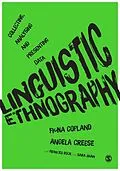This succinct overview focusses on the experience of conducting linguistic ethnography and the role of the researcher, providing readers with both a philosophical and practical introduction
Autorentext
Fiona Copland is a Senior Lecturer in the School of Languages and Social Sciences at Aston University, Birmingham where she is Director of CLERA (Centre for Language Education Research at Aston). Before working in higher education, she was an English language teacher in Nigeria, Hong Kong, Japan and the UK, where she also taught on a range of teacher education programmes. This background has influenced her research interests which include talk in pre-service teacher education conferences and teaching English to young learners, and she has published in these areas. Since attending a course in ethnography, language and communication jointly run by King's College University of London and the Institute of Education University of London, she has been an active member of the Linguistic Ethnography Forum, co-organising three conferences. At Aston, Fiona is the Programmes Director of MSc TESOL courses and teaches a range of post-graduate modules. She also supervises PhD students in the field of TESOL.
Zusammenfassung
This is an engaging interdisciplinary guide to the unique role of language within ethnography. The book provides a philosophical overview of the field alongside practical support for designing and developing your own ethnographic research. It demonstrates how to build and develop arguments and engages with practical issues such as ethics, transcription and impact. There are chapter-long case studies based on real research that will explain key themes and help you create and analyse your own linguistic data. Drawing on the authors' experience they outline the practical, epistemological and theoretical decisions that researchers must take when planning and carrying out their studies. Other key features include: A clear introduction to discourse analytic traditions Tips on how to produce effective field notes Guidance on how to manage interview and conversational data Advice on writing linguistic ethnographies for different audiences Annotated suggestions for further reading Full glossary This book is a master class in understanding linguistic ethnography, it will of interest to anyone conducting field research across the social sciences.
Inhalt
Ethnography and Language
Linguistic Ethnography
Data in Linguistic Ethnography
Doing Research in Linguistic Ethnography: Building the Case
Case study one: Reflexivity, voice and representation in linguistic ethnography
Case study two: Researching feedback conferences in pre-service teacher training
Case study three: Ethnography and the workplace
Case study four: Ethnography, language and healthcare planning
Practical Issues in Linguistic Ethnographic Research
Empiricism, ethics and impact
Transcription, translation and technology
Writing up: genres, writer voice, audience
Ways forward
